英语译林牛津版英语六年级上册知识点整理
牛津译林版小学六年级英语上册 Unit4单元知识 总结

牛津译林版小学六年级英语上册 Unit4单元知识总结一·四会单词1.ago2.office2.office办公室3.newspaper(可数)报纸4.news 新闻5. watch 观看(动)6.e-book 电子书7.with 用;和...一起(介词)8.yesterday 昨天二.四会词组1.six years ago 六年前2.write letters写信write letters to sb 写信给某人3.in the office 在办公4.read newspapers for news读报纸获得新闻5.read e-books 读电子书6.call people 给人们打电话7.watch news观看新闻8.write emails = write an email 写电子邮件9.then and now 过去和现在10.make friends 交朋友11.listen to the radio 听广播listen to me 听我说12.on the Internet 在网上13.all over the world 全世界14.at school 在学校15.buy things from shops 从商店买东西16.be on holiday 在度假e sth to do sth 使用某物做某事use the telephone to call poople 使用电话给人们打电话18.do shopping =go shopping 购物19.work hard 努力工作20.look out of ...朝...外看21.wait for+宾格(me.him.her ) 等待...22.go on(doing sth)继续(做某事)23.get angry = be angry (形)生气24.make a sentence with ..用...造句25.in the cake 在蛋糕里26.an English lesson 一节英语课27.a mobile phone 一部手机28.an e-book 一个电子书29.six years old 六岁30.invent the train 发明火车三.四会句子1.Six years ago , Mike could read and draw ,but he could not write .六年前,迈克会阅读和画画,但是他不会写字。
译林版小学英语六年级上册全册知识点梳理.doc
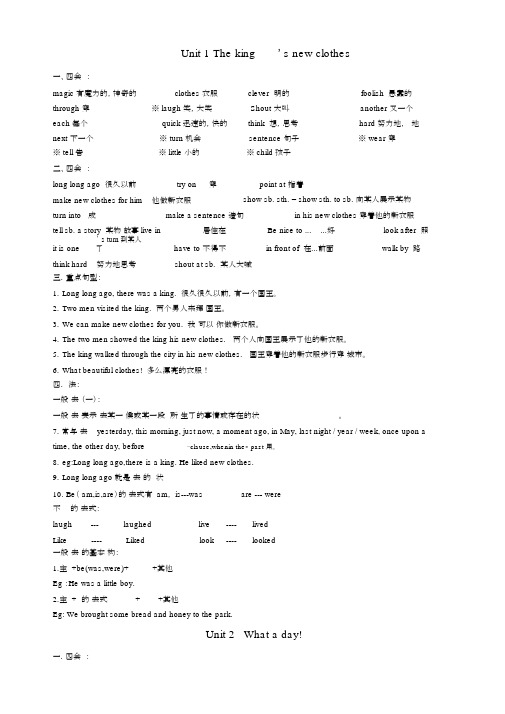
Unit 1 The king’ s new clothes一、四会:magic 有魔力的,神奇的clothes 衣服clever 明的foolish 愚蠢的through 穿※ laugh 笑,大笑Shout 大叫another 又一个each 每个quick 迅速的,快的think 想,思考hard 努力地,地next 下一个※ turn 机会sentence 句子※ wear 穿※ tell 告※ little 小的※ child 孩子二、四会:long long ago 很久以前try on 穿point at 指着make new clothes for him 他做新衣服show sb. sth. = show sth. to sb. 向某人展示某物turn into 成make a sentence 造句in his new clothes 穿着他的新衣服tell sb. a story 某物故事live in 居住在Be nice to ... ...好look after 照it is one ’ s turn到某人了have to 不得不in front of 在...前面walk by 路think hard 努力地思考shout at sb. 某人大喊三.重点句型:1.Long long ago, there was a king. 很久很久以前,有一个国王。
2.Two men visited the king. 两个男人来拜国王。
3.We can make new clothes for you. 我可以你做新衣服。
4.The two men showed the king his new clothes. 两个人向国王展示了他的新衣服。
5.The king walked through the city in his new clothes. 国王穿着他的新衣服步行穿城市。
牛津译林版六年级英语上册Unit 6 Keep our city clean知识点
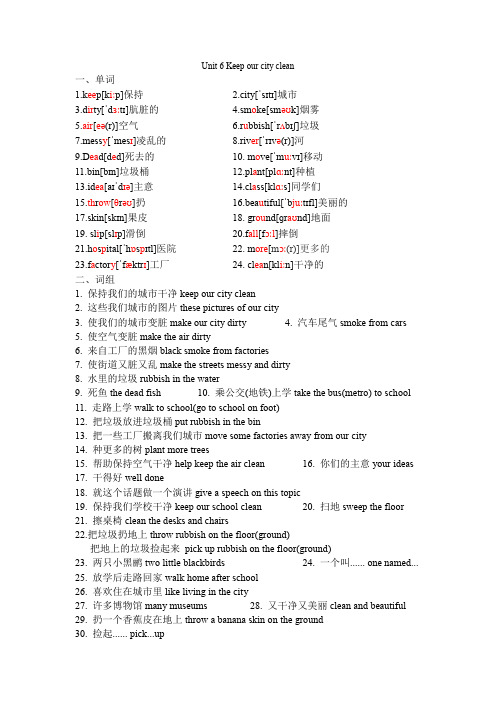
Unit 6 Keep our city clean一、单词1.k ee p[k iːp]保持2.city[ˈsɪtɪ]城市3.d ir ty[ˈdɜːtɪ]肮脏的4.sm o ke[sməʊk]烟雾5.air[eə(r)]空气6.r u bbish[ˈrʌbɪʃ]垃圾7.mess y[ˈmesɪ]凌乱的8.riv er[ˈrɪvə(r)]河9.D ea d[d e d]死去的10. m o ve[ˈm uːvɪ]移动11.bin[bɪn]垃圾桶12.pl a nt[plɑːnt]种植13.id ea[aɪˈdɪə]主意14.cl a ss[klɑːs]同学们15.th r ow[θrəʊ]扔16.bea u tiful[ˈb juːtɪfl]美丽的17.skin[skɪn]果皮18. gr ou nd[ɡr aʊnd]地面19. sl i p[slɪp]滑倒20.f all[fɔːl]摔倒21.h o s p ital[ˈhɒs pɪtl]医院22. m ore[mɔː(r)]更多的23.f a ctor y[ˈfæktrɪ]工厂24. cl ea n[kl iːn]干净的二、词组1. 保持我们的城市干净keep our city clean2. 这些我们城市的图片these pictures of our city3. 使我们的城市变脏make our city dirty4. 汽车尾气smoke from cars5. 使空气变脏make the air dirty6. 来自工厂的黑烟black smoke from factories7. 使街道又脏又乱make the streets messy and dirty8. 水里的垃圾rubbish in the water9. 死鱼the dead fish 10. 乘公交(地铁)上学take the bus(metro) to school11. 走路上学walk to school(go to school on foot)12. 把垃圾放进垃圾桶put rubbish in the bin13. 把一些工厂搬离我们城市move some factories away from our city14. 种更多的树plant more trees15. 帮助保持空气干净help keep the air clean 16. 你们的主意your ideas17. 干得好well done18. 就这个话题做一个演讲give a speech on this topic19. 保持我们学校干净keep our school clean 20. 扫地sweep the floor21. 擦桌椅clean the desks and chairs22.把垃圾扔地上throw rubbish on the floor(ground)把地上的垃圾捡起来pick up rubbish on the floor(ground)23. 两只小黑鹂two little blackbirds 24. 一个叫...... one named...25. 放学后走路回家walk home after school26. 喜欢住在城市里like living in the city27. 许多博物馆many museums 28. 又干净又美丽clean and beautiful29. 扔一个香蕉皮在地上throw a banana skin on the ground30. 捡起...... pick...up31. 滑倒在那块香蕉皮上slip on the banana skin 32. 去看病go to hospital 33. 为了保持公园干净to keep the park clean 34. 那样做do that 35. 太迟了too late三、句子1. What makes the air dirty? 什么使空气变脏?Smoke makes the air dirty. 烟雾使空气变脏。
牛津译林版英语六年级上册Units1-4 重难点知识归纳总结
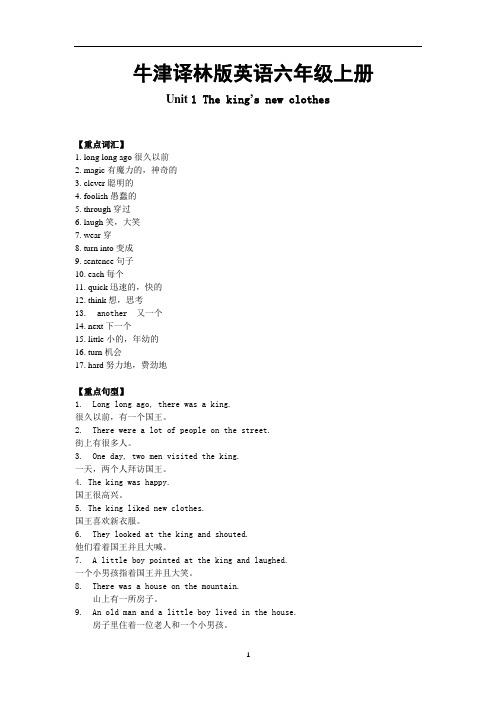
牛津译林版英语六年级上册Unit 1 The king’s new clothes【重点词汇】1. long long ago 很久以前2. magic 有魔力的,神奇的3. clever 聪明的4. foolish 愚蠢的5. through 穿过6. laugh 笑,大笑7. wear 穿8. turn into 变成9. sentence 句子10. each 每个11. quick 迅速的,快的12. think 想,思考13. another 又一个14. next 下一个15. little 小的,年幼的16. turn 机会17. hard 努力地,费劲地【重点句型】1. Long long ago, there was a king.很久以前,有一个国王。
2. There were a lot of people on the street.街上有很多人。
3. One day, two men visited the king.一天,两个人拜访国王。
4. The king was happy.国王很高兴。
5. The king liked new clothes.国王喜欢新衣服。
6. They looked at the king and shouted.他们看着国王并且大喊。
7. A little boy pointed at the king and laughed.一个小男孩指着国王并且大笑。
8. There was a house on the mountain.山上有一所房子。
9. An old man and a little boy lived in the house.房子里住着一位老人和一个小男孩。
10. The old man told the boy a story.老人给男孩讲了一个故事。
Unit 2 What a day!【重点词汇】1. sunny 晴朗的2. show 展览,展示3. interesting 有趣的,有意思的4. weather 天气5. become 变成,变为6. windy 有风的7. cloudy 多云的8. high 在高处9. honey 蜂蜜10. drink 饮料11. ant 蚂蚁12. bee 蜜蜂13. cloud 云14. rain 下雨15. rainy 多雨的16. meet 遇见17. lose 丢失18. know 知道19. climb up 爬上20. hold onto 抓紧23. fly away 飞走【重点句型】1. It was sunny/cloudy/windy/rainy.天气晴朗/多云/多风/多雨。
牛津译林版六年级上册英语全册语法知识点详解(unit1)
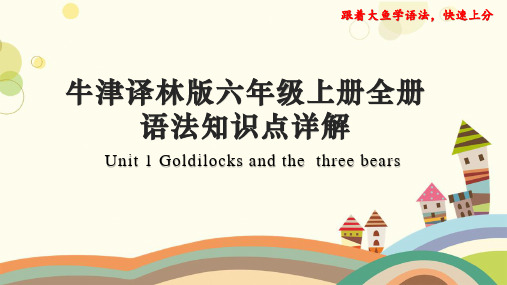
一、一般过去时的用法
(三)过去式变形规则 3. 其他动词。 (4)以“辅元辅”结尾的动词,双写这个辅音字母再加ed。如: stop→stopped、drop→dropped (5)不规则变化。如: go→went、see→saw、bring→brought、catch→caught、 sleep→slept、make→made、p)标志词 6. once(曾经);once upon a time(从前) eg: Once upon a time, the king liked new clothes. 7. last+一段时间(night/week/month/ year等) eg: We went shopping last Saturday. 8. ago(two days ago);long long ago eg: We had a picnic a week ago. 9. One day eg: One day, he got lost in the forest. 10.in +2020年以前的年份。 eg: Lily lived in Beijing in 2016.
二、现在进行时的用法
(四)注意事项 1. 根据主语单复数选用合适的be动词: 单数用is,复数用are 2. 动词ing的规则需牢记: (1)一般在动词后加ing。如:work→working、read→reading (2)以不发音的e结尾的动词,去掉e,再加ing。如:smile→smiling、write→writing。 (3)以重读闭音节结尾的且词尾只有一个辅音字母的,双写这个辅音字母加ing。常见的有: sit→sitting、stop→stopping、run→running、swim→swimming、shop →shopping。
牛津译林版六年级英语上册第一单元6A Unit4词汇和句型知识点
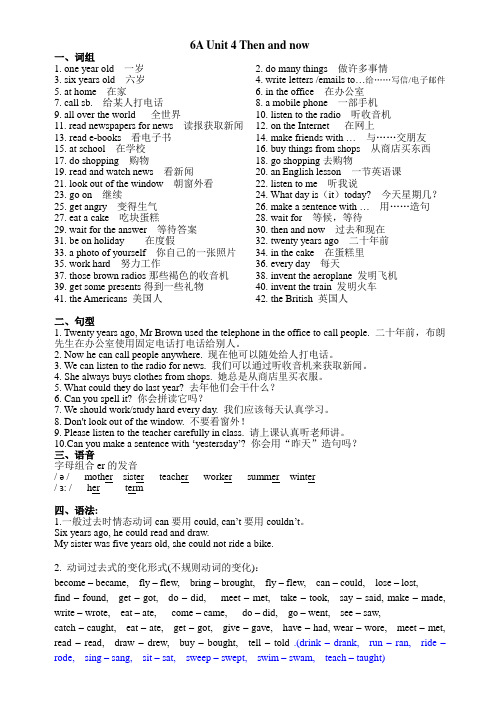
6AUnit4 Then and now
一、词组
1.oneyearold一岁2. do many things做许多事情
3.six years old六岁4. write letters/emailsto…给……写信/电子邮件
5. at home在家6. in the office在办公室
7. call sb.给某人打电话8. a mobile phone一部手机
11.读报获取新闻___________________12.在网上________________________
13.看一本电子书___________________14.与……交朋友__________________
15.在学校_________________________16.从商店买东西__________________
31.beon holiday在度假32.twenty years ago二十年前
33. a photo of yourself你自己的一张照片34. in the cake在蛋糕里
35. work hard努力工作36. every day每天
37.those brown radios那些褐色的收音机38.invent the aeroplane发明飞机
29.得到一些礼物___________________30.过去和现在____________________
31.在度假__________________________32.发明火车______________________
33.你自己的一张照片________________34.在蛋糕里_____________________
牛津译林英语六年级上 册Unit4 Then and now单元知识点归纳
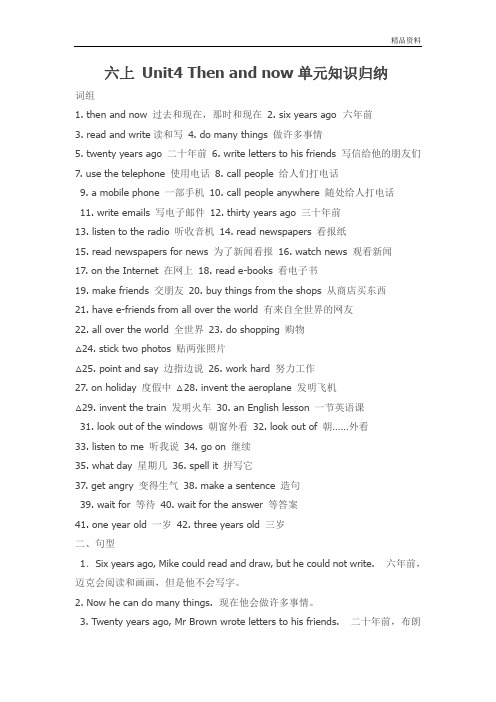
六上Unit4 Then and now单元知识归纳词组1. then and now 过去和现在,那时和现在2. six years ago 六年前3. read and write读和写4. do many things 做许多事情5. twenty years ago 二十年前6. write letters to his friends 写信给他的朋友们7. use the telephone 使用电话8. call people 给人们打电话9. a mobile phone 一部手机10. call people anywhere 随处给人打电话11. write emails 写电子邮件12. thirty years ago 三十年前13. listen to the radio 听收音机14. read newspapers 看报纸15. read newspapers for news 为了新闻看报16. watch news 观看新闻17. on the Internet 在网上18. read e-books 看电子书19. make friends 交朋友20. buy things from the shops 从商店买东西21. have e-friends from all over the world 有来自全世界的网友22. all over the world 全世界23. do shopping 购物△24. stick two photos 贴两张照片△25. point and say 边指边说26. work hard 努力工作27. on holiday 度假中△28. invent the aeroplane 发明飞机△29. invent the train 发明火车30. an English lesson 一节英语课31. look out of the windows 朝窗外看32. look out of 朝……外看33. listen to me 听我说34. go on 继续35. what day 星期几36. spell it 拼写它37. get angry 变得生气38. make a sentence 造句39. wait for 等待40. wait for the answer 等答案41. one year old 一岁42. three years old 三岁二、句型1.Six years ago, Mike could read and draw, but he could not write. 六年前,迈克会阅读和画画,但是他不会写字。
牛津译林版英语六年级上册《Keep our city clean》基础知识
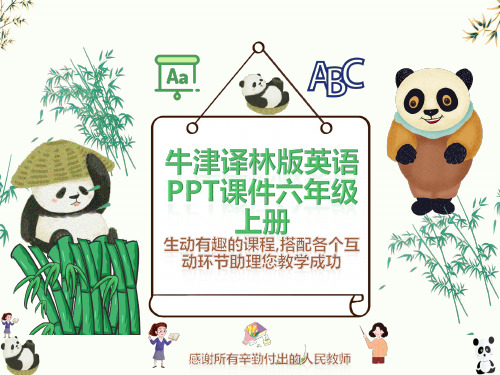
11.dead 12.bin
死的 垃圾桶
重点单词
13.plant 种植,栽种 14.more 更多的
15.throw 16.skin
扔 果皮
重点单词
17.slip 18.fall
滑倒 摔倒
重点短语
1. keep our city clean 保持我们的城市整洁
2.move…away from 从……搬走
重点句型
1. What makes the streets messy and dirty? 什么使街道变得又乱又脏?
2.What can we do to keep our city clean? 我们可以做什么来保持我们的城市整洁?
重点句型
We can move some factories away from our city. 我们可以把一些工厂搬离我们的城市.
Unit 6 Keep our city clean
基础知识
重点单词
1.keep 2.c 4.dirty
使……变得 肮脏的
重点单词
5.museum
博物馆
6.ground
地面,地上
7.air
空气
8.smoke 烟雾
重点单词
9.rubbish
垃圾
10.messy 肮脏的,乱七八糟的
We can put rubbish in the bin. 我们可以把垃圾放进垃圾桶.
重点句型
We can plant more trees. 我们可以种更多的树.
重点语法
can的句型结构
肯定句:主语+can+动词原形+其他. 否定句:主语+can”t+动词原形+其他. 一般疑问句:Can+主语+动词原形+其他? 肯定回答:Yes,主语+can. 否定回答:No, 主语+can”t. 特殊疑问句:特殊疑问词+can+主语+动词原形+其他?
译林牛津版六年级知识点整理

精心整理知识点归纳班级:姓名:句子时态归纳一、一般现在时(句子中通常有always,usually,often,sometimes,never,every…,onMondays/…)1、句型结构:主语+V.(s)如果主语是三单,谓语动词加s或者es.2(1(2(3(412(1(2(3put—12(1(2e.g.stop–stopped,shop–shopped(3)原形与过去式同型e.g.read-read,hit-hit,put-put,let-let,cut-cut,lose—lost(4)以辅音+y结尾去y变i+ede.g.copy-copied,cry-cried,study-studied,become-became(5谓语动词结构是:begoingto+do(表示计划、打算做…)或者will+do(表示即将发生…)句型结构:主语+begoingto/will+V.原形’t后面,(试着动词如:help(helpme)/let(letus)/make(you)…介词如:for(me)/from(him)/to(you)…名词使用1、alotof,lotsof,some,afew,many,howmany后面加可数名词复数,alotof,lotsof,some,alittle,much,howmuch后面加不可数名词。
(1)一般情况,+s(2)名词以s、x、sh、ch结尾,+es(3)名词以“o”结尾,有生命的+es(如potato—potatoes);无生命的+s(如photo—photos)(4)名词以“y”结尾,元音(a,e,i,o,u)+y结尾——直接+s;辅音+y结尾——去y变i+es(5)名词以“f”/“fe”结尾,去f/fe变ve+s(61.2.3.12、3、-ist结尾:piano---pianist,science---scientist,art---artist,牙医dentist4、-man结尾:post---postman,milk---milkman,space---spaceman,fire---fireman___5、男/女职业:police---policeman(男),police---policewoman(女)act---actor(男),act---actress(女)wait---waiter(男),wait---waitress(女)6、医生doctor,护士nurse,农民farmer,宇航员astronaut7、China中国-Chinese中国人America美国-American美国人France法国-French法国人theUK英国-British英国人England英国-English英国人Australia澳大利亚-Australian澳大利亚人Japan日本-Japanese日本人theUS/America美国-American美国人句型转化一、一般疑问句做法:(1)有Be动词(am\is\are\was\were)时,将Be动词提到句首,剩余部分照抄;(2)有情态动词can/would/must/will/should时,将can/would/must/will/should提到句首,剩余部分照抄;(3词(4(1(2)didn’t.(1、It’e.g.It’2、3、4、5、6、7、8、e.g.Wheredoyoucomefrom?=Whereareyoufrom?IcomefromChina.=IamfromChina.9.What+名词短语!=How+形容词+名词!e.g.Whatanicebook!=Hownicethebookis!10.begoodat=dowellineg:I’mgoodatplayingbasketball.=Idowellinplayingbasketball.11.lookafter=takecareofEg:Youshouldlookafteryourlittlesister.=Youshouldtakecareofyourlittlesister.12.Hewalkstoschooleveryday.=Hegoestoschoolonfooteveryday.几点补充说明1、excited用来形容人,exciting用来形容事物,excitedly用来形容人的动作。
牛津译林版六年级英语上册第一单元6A Unit2词汇和句型知识点

6A Unit 2 What a day!一、词组1.go to the park by bike 骑自行车去公园2.go to school on foot/walk to school步行去上学3.become cloudy 变得多云4.look sad 看起来难过5.what a day怎样的一天啊st Sunday 上周日7.this Sunday 这周日8.next Sunday 下周日9.a parrot show 一场鹦鹉表演10.fly kites high in the sky把风筝放到高高的空中11.many black clouds许多乌云12.some interesting parrots 一些有趣的鹦鹉13.go away 走开14.fly away飞走15.want to know 想要知道16.near the hill 在小山附近17.bring some drinks 带来一些饮料18.fly too high 飞得太高19.in your diary 在你的日记里20.write about …写关于……21.cheer together 一起欢呼22.hold onto it紧紧抓住它23.lose my new kite 丢失我的新风筝24.lose one’s way 迷路25.bring lunch to the park带午餐去公园26.watch a film 看电影27.a busy day忙碌的一天28.go swimming去游泳29.climb up the hill爬上小山30. meet him in the park在公园遇见他31.time for lunch该吃午饭了32. pick three cards 挑选三张卡片e again another day改天再来34. on a rainy morning 在一个雨天的早上35.on Monday afternoon在周一下午36.do housework做家务37.find my English book找到我的英语书38.have a picnic on the grass在草地上野餐二、句型1. I get up at six every morning. But this morning, I got up at six thirty.我每天六点起床。
牛津译林版小学英语六年级上册《unit2whataday》知识点详解知识讲解教案

牛津译林版小学英语六年级上册《unit2whataday》知识点详解知识讲解教案1. Unit2 What a day本单元主要内容是介绍时间、描述一天的活动,以及介绍一些早上和晚上常见的活动。
通过本单元的学习,学生将掌握日常生活的一些基本表达方式。
2. 词汇本单元涉及的一些常见词汇如下: - get up 睡醒,起床 - have breakfast 吃早餐 - have lunch 吃午餐 - have dinner 吃晚餐 - go to bed 上床睡觉 - brush teeth 刷牙- wash face 洗脸 - watch TV 看电视 - do homework 做功课3. 语法本单元的语法主要是询问时间和介绍一天中的活动。
常用的句型有: - What time is it? 现在几点钟? - It’s seven o’clock. 现在是七点钟。
- What do you do in the morning/afternoon/evening? 你早上/下午/晚上做什么? - I get up at six. 我六点钟起床。
- I have breakfast at seven. 我七点钟吃早餐。
4. 句型练习下面是几个句型的练习,可以帮助学生更好地掌握本单元的语言点。
1.What time is it? It’s ____________.2.What time do you get up in the morning? I getup at ____________.3.What do you do in the evening? I ____________.4.What time do you have lunch? I have lunch at____________.5.What do you do before going to bed? I____________.5. 文化知识本单元还涉及到一些文化知识,例如西方国家的饮食文化和作息习惯。
小学英语六年级 上册 (牛津译林版)Unit1 king's new clothes 知识点复习资料
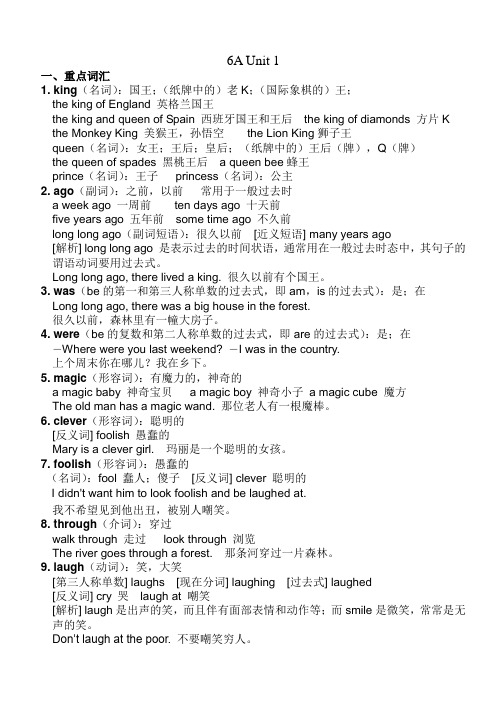
6A Unit 1一、重点词汇1. king(名词):国王;(纸牌中的)老K;(国际象棋的)王;the king of England 英格兰国王the king and queen of Spain 西班牙国王和王后the king of diamonds 方片K the Monkey King 美猴王,孙悟空the Lion King狮子王queen(名词):女王;王后;皇后;(纸牌中的)王后(牌),Q(牌)the queen of spades 黑桃王后 a queen bee蜂王prince(名词):王子princess(名词):公主2. ago(副词):之前,以前常用于一般过去时a week ago 一周前ten days ago 十天前five years ago 五年前some time ago 不久前long long ago(副词短语):很久以前[近义短语] many years ago[解析] long long ago 是表示过去的时间状语,通常用在一般过去时态中,其句子的谓语动词要用过去式。
Long long ago, there lived a king. 很久以前有个国王。
3. was(be的第一和第三人称单数的过去式,即am,is的过去式):是;在Long long ago, there was a big house in the forest.很久以前,森林里有一幢大房子。
4. were(be的复数和第二人称单数的过去式,即are的过去式):是;在-Where were you last weekend? -I was in the country.上个周末你在哪儿?我在乡下。
5. magic(形容词):有魔力的,神奇的a magic baby 神奇宝贝 a magic boy 神奇小子a magic cube 魔方The old man has a magic wand. 那位老人有一根魔棒。
牛津译林版六年级英语上册第六单元unit6 知识汇总
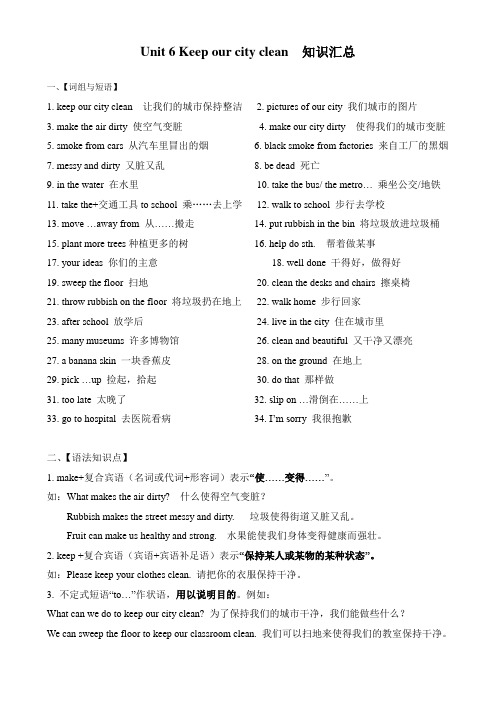
Unit 6 Keep our city clean 知识汇总一、【词组与短语】1. keep our city clean 让我们的城市保持整洁2. pictures of our city 我们城市的图片3. make the air dirty 使空气变脏4. make our city dirty 使得我们的城市变脏5. smoke from cars 从汽车里冒出的烟6. black smoke from factories 来自工厂的黑烟7. messy and dirty 又脏又乱8. be dead 死亡9. in the water 在水里10. take the bus/ the metro…乘坐公交/地铁11. take the+交通工具to school 乘……去上学12. walk to school 步行去学校13. move …away from 从……搬走14. put rubbish in the bin 将垃圾放进垃圾桶15. plant more trees种植更多的树16. help do sth. 帮着做某事17. your ideas 你们的主意18. well done 干得好,做得好19. sweep the floor 扫地20. clean the desks and chairs 擦桌椅21. throw rubbish on the floor 将垃圾扔在地上22. walk home 步行回家23. after school 放学后24. live in the city 住在城市里25. many museums 许多博物馆26. clean and beautiful 又干净又漂亮27. a banana skin 一块香蕉皮28. on the ground 在地上29. pick …up 捡起,拾起30. do that 那样做31. too late 太晚了32. slip on …滑倒在……上33. go to hospital 去医院看病34. I’m sorry 我很抱歉二、【语法知识点】1. make+复合宾语(名词或代词+形容词)表示“使……变得……”。
英语译林(牛津)版英语六年级上册知识点整理.doc
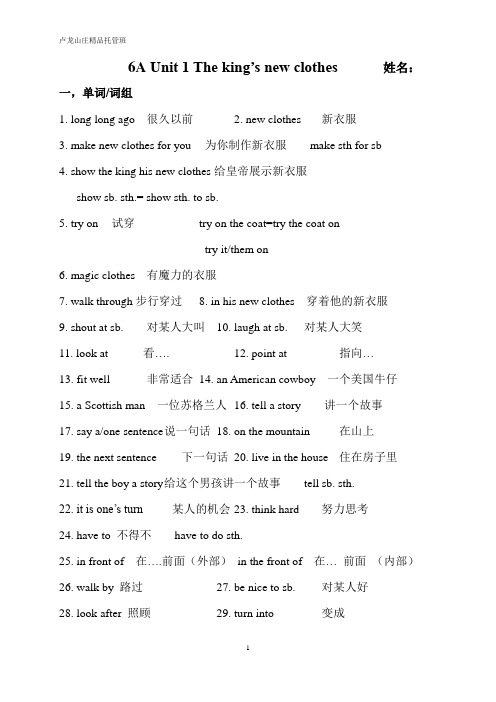
卢龙山庄精品托管班6A Unit 1 The king’s new clothes姓名:一,单词/词组1. long long ago 很久以前2. new clothes 新衣服3. make new clothes for you 为你制作新衣服make sth for sb4. show the king his new clothes给皇帝展示新衣服show sb. sth.= show sth. to sb.5. try on 试穿try on the coat=try the coat ontry it/them on6. magic clothes 有魔力的衣服7. walk through步行穿过8. in his new clothes 穿着他的新衣服9. shout at sb. 对某人大叫10. laugh at sb. 对某人大笑11. look at 看….12. point at 指向…13. fit well 非常适合14. an American cowboy 一个美国牛仔15. a Scottish man 一位苏格兰人16. tell a story 讲一个故事17. say a/one sentence 说一句话18. on the mountain 在山上19. the next sentence 下一句话20. live in the house 住在房子里21. tell the boy a story 给这个男孩讲一个故事tell sb. sth.22. it is one’s turn 某人的机会 23. think hard 努力思考24. have to 不得不have to do sth.25. in front of 在….前面(外部)in the front of 在… 前面(内部)26. walk by 路过27. be nice to sb. 对某人好28. look after 照顾29. turn into 变成二,句型1. Long long ago, there was a king. 很久很久以前,有一位国王。
(完整版)译林牛津六年级上学期英语语法总结
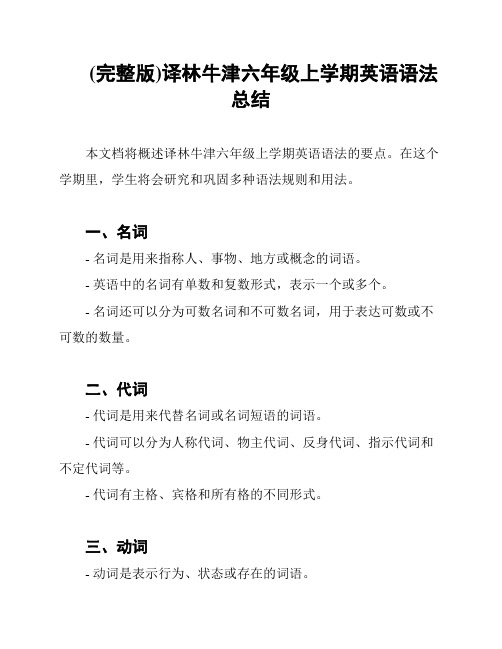
(完整版)译林牛津六年级上学期英语语法
总结
本文档将概述译林牛津六年级上学期英语语法的要点。
在这个学期里,学生将会研究和巩固多种语法规则和用法。
一、名词
- 名词是用来指称人、事物、地方或概念的词语。
- 英语中的名词有单数和复数形式,表示一个或多个。
- 名词还可以分为可数名词和不可数名词,用于表达可数或不可数的数量。
二、代词
- 代词是用来代替名词或名词短语的词语。
- 代词可以分为人称代词、物主代词、反身代词、指示代词和不定代词等。
- 代词有主格、宾格和所有格的不同形式。
三、动词
- 动词是表示行为、状态或存在的词语。
- 动词有时态、人称和语态的变化形式。
- 动词可以用来表达现在、过去和将来的事件。
四、形容词和副词
- 形容词用于描述或修饰名词,表示特征或性质。
- 形容词可以有不同的级别,包括原级、比较级和最高级。
- 副词用于修饰动词、形容词或其他副词,表示程度、方式或时间等。
五、介词
- 介词用于表示位置、方向、时间和关系等。
- 介词通常与名词或代词连用,构成介词短语。
六、连词
- 连词用于连接词语、短语、句子或句子成分。
- 连词可以是并列连词、从属连词或关联连词。
七、句子
- 句子是由词语组成的表达完整意思的语言单位。
- 句子可以简单句或复合句,包括主语、谓语和宾语等要素。
以上是译林牛津六年级上学期英语语法的总结要点。
通过学习这些语法规则和用法,学生可以提高英语表达的准确性和流利度。
牛津英语译林版六年级上册第三单元Unit3知识点梳理.docx
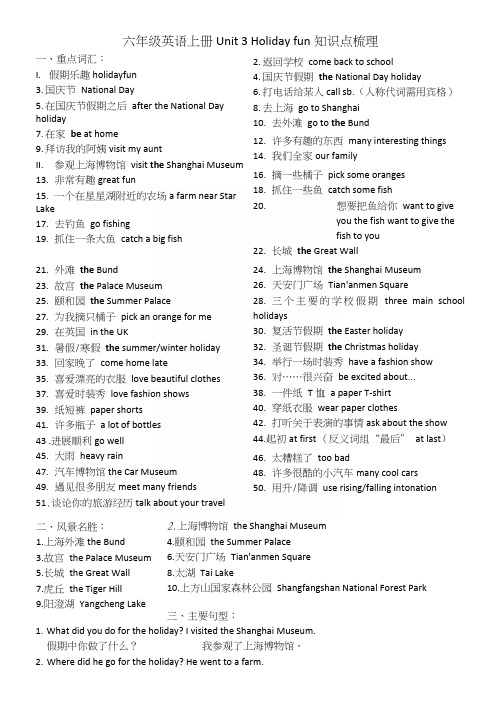
六年级英语上册Unit 3 Holiday fun 知识点梳理一、重点词汇: I. 假期乐趣holidayfun 3. 国庆节 National Day5. 在国庆节假期之后 after the National Day holiday7. 在家 be at home9. 拜访我的阿姨visit my auntII. 参观上海博物馆 visit the Shanghai Museum 13. 非常有趣great fun15. 一个在星星湖附近的农场a farm near Star Lake17. 去钓鱼 go fishing19. 抓住一条大鱼 catch a big fish 21. 外滩 the Bund23. 故宫 the Palace Museum 25. 颐和园 the Summer Palace 27. 为我摘只橘子 pick an orange for me 29. 在英国 in the UK31. 暑假/寒假 the summer/winter holiday 33. 回家晚了 come home late35. 喜爱漂亮的衣服 love beautiful clothes 37. 喜爱时装秀 love fashion shows 39. 纸短裤 paper shorts 41. 许多瓶子 a lot of bottles 43 .进展顺利go well 45. 大雨 heavy rain47. 汽车博物馆the Car Museum 49. 遇见很多朋友meet many friends 51.谈论你的旅游经历talk about your travel2. 返回学校 come back to school4. 国庆节假期 the National Day holiday6. 打电话给某人call sb.(人称代词需用宾格) 8. 去上海 go to Shanghai 10. 去外滩 go to the Bund12. 许多有趣的东西 many interesting things 14. 我们全家our family16. 摘一些橘子 pick some oranges 18. 抓住一些鱼 catch some fish 20.想要把鱼给你 want to give you the fish want to give the fish to you22. 长城 the Great Wall24. 上海博物馆 the Shanghai Museum26. 天安门广场 Tian'anmen Square28. 三个主要的学校假期three main school holidays30. 复活节假期 the Easter holiday 32. 圣诞节假期 the Christmas holiday 34. 举行一场时装秀 have a fashion show 36. 对……很兴奋 be excited about... 38. 一件纸 T 恤 a paper T-shirt40. 穿纸衣服 wear paper clothes42. 打听关于表演的事情ask about the show 44.起初at first (反义词组“最后” at last ) 46. 太糟糕了 too bad48. 许多很酷的小汽车many cool cars 50. 用升/降调 use rising/falling intonation2.上海博物馆 the Shanghai Museum4.颐和园 the Summer Palace 6.天安门广场 Tian'anmen Square 8.太湖 Tai Lake10.上方山国家森林公园 Shangfangshan National Forest Park 三、主要句型:1. What did you do for the holiday? I visited the Shanghai Museum. 假期中你做了什么? 我参观了上海博物馆。
牛津译林版小学六年级英语上册 Unit3 单元知识 总结
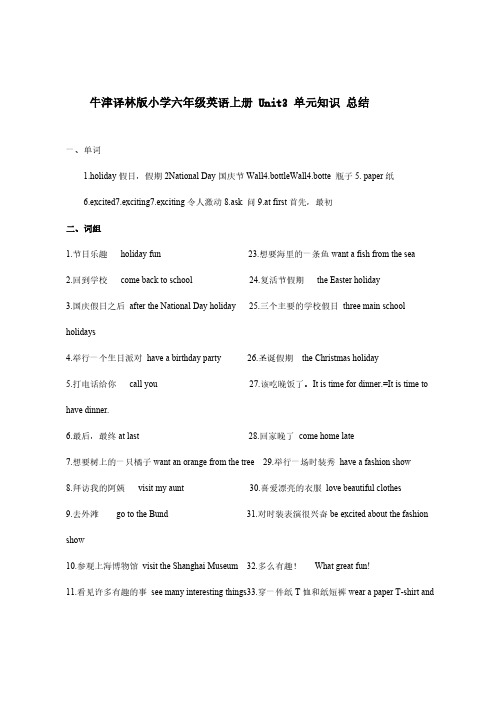
牛津译林版小学六年级英语上册 Unit3 单元知识总结一、单词1.holiday假日,假期2National Day国庆节Wall4.bottleWall4.botte 瓶子5. paper纸6.excited7.exciting7.exciting令人激动8.ask 问9.at first首先,最初二、词组1.节日乐趣holiday fun 23.想要海里的一条鱼want a fish from the sea2.回到学校come back to school 24.复活节假期the Easter holiday3.国庆假日之后after the National Day holiday 25.三个主要的学校假日three main school holidays4.举行一个生日派对have a birthday party 26.圣诞假期the Christmas holiday5.打电话给你call you 27.该吃晚饭了。
It is time for dinner.=It is time to have dinner.6.最后,最终at last 28.回家晚了come home late7.想要树上的一只橘子want an orange from the tree 29.举行一场时装秀have a fashion show8.拜访我的阿姨visit my aunt 30.喜爱漂亮的衣服love beautiful clothes9.去外滩go to the Bund 31.对时装表演很兴奋be excited about the fashion show10.参观上海博物馆visit the Shanghai Museum 32.多么有趣!What great fun!11.看见许多有趣的事see many interesting things33.穿一件纸T恤和纸短裤wear a paper T-shirt andpaper shorts12.遇见很多朋友meet many friends 34.询问某人有关某事ask sb. about sth.13.有趣的事great fun 35.穿着纸衣服wear paper clothes14.我们的家人our family 36.穿了许多瓶子wear a lot of bottles15.去农场go to a farm 37.打听有关表演的事ask about the show16.在星星湖边near Star Lake 38.进展顺利go well17.为我摘只橘子pick an orange for me 39.起初很完美。
牛津译林版六年级英语上册Unit6知识点汇总

牛津译林版六年级英语上册Unit 6 知识点整理汇总I词组1. live near/ far away from2. go to ... by bus / ferry / underground=take a(n) bus / ferry / underground to ... 3. go to ... on foot = walk to ...4. How long does it take sb. to do sth.?=How long do/does sb. spend (in) doing sth.?5.It takes sb. some time to do sth.=sb. spend(s) some time (in) doing sth.6.about half an hour7.one hour and a half=one and a half hours8.the amount of time9.an advertisement board10. a few department stores=some department stores11.a little pollution = some pollution12.a lot of = lots of 否认形式: not much / not many13.on the bus / train / underground14.in the car15.on one ’ s way to sp.16.one one ’ s way home / there/ here17.by light rail18.in the housing estate19.at the police station20.get to sp./ get there住的离近/远乘公交车 /渡轮 /地铁去某地步行去某地某人花多少时间做某事?某人花(时间)做某事大概半小时一个半小时时间的量一个广告牌一些百货商铺一些污染很多在公交车 /火车 /地铁上在小轿车里在某人去某地的路上在某人回家 /去那边 /来这儿的路上乘轻轨在居民区里在警察局抵达某地/ 到那边II. 词性变换1. travel v. (travelled, travelled, travelling)traveller n. 旅游者A traveler is a person who is on a trip or a person who travels a lot.旅游者是一个人正在旅游或许一个人旅游好多。
牛津译林版-英语-六年级上册--Unit1《The king’s new cloths》第一单元短语、词汇、知识点梳理 译林版

小学-英语-上册-打印版小学-英语-上册-打印版Unit1 The king’s new clothes 知识点梳理一、短语积累1. the king’s clothes 皇帝的新装2. long long ago 很久以前3. one day 有一天4. two men/women 两个男人/女人5. like new clothes 喜欢新衣服6. make…for 给……做7. visit the king 拜访国王8. show sth to sbshow sb sth 展示给……看 9. try on these magic clothes 试穿这些魔力衣服10. clever / foolish people 聪明/愚蠢的人 a lot of/lots of/many people 许多人 11. walk through the city 步行穿过这座城市 12. look at 看…… 13. in the street 在街上 14. shout at 向…..大喊 15. a little boy 一个小男孩 16. point at 指着 17. laugh at 嘲笑 18. in the new clothes wear the new clothes 穿着新衣服 wear yellow 穿黄色的衣服 19. fit well 很适合 20. get…from 从……得到21. come to my party 来参加我的聚会 22. at half past four 在四点半23. an American cowboy 一个美国的西部牛仔 24. a Scottish man 一个苏格兰男人 25. wear jeans 穿着牛仔裤wear a kilt 穿苏格兰短裙 26. play a game/play games做游戏,玩游戏27. tell a story/tell stories 讲故事 28. each/every student 每一个学生 29. say one sentence 说一个句子 30. on the mountain 在山上 31. the next sentence 下一个句子 32. live in 居住在33. Bobby’s turn 博比的机会 34. What’s next? 接下来呢? 35. think hard 冥思苦想 36. have to 不得不,必须 37. start …again 重新开始 38. in the forest 在森林里 39. in front of 在……前面 40. by the house 房子附近41. pick a flower/pick flowers 摘一朵花 42. be angry 生气的 43. pick up 捡起,拾起44. give me your child 把你的孩子给我 45. be nice to her (宾格)对她很好 46. live with the lion 和狮子住在一起 47. look after 照顾48. turn into a prince 变成一个王子小学-英语-上册-打印版49.What beautiful clothes! 多漂亮的衣服啊!二、重点句型、语法点拔1、there be结构在一般过去时的各种句型转换:There be结构的组成:There be + 名词短语+方位短语.(数量词+名词)(1)肯定句:e.g.: Long long ago, there was a king. /There were a lot of people in the street.(2)否定句:在be动词was或were后+not, some要改成any.e.g.: There were some people in the street.(否定句)There were not any people in the street.(3) 一般疑问句及其肯定和否定回答:e.g.: A: Was there a house on the mountain?B: Yes, there was. / No, there wasn’t.(4)有关there be的特殊疑问句的问答:A1:What was in front of the lion’s house?(针对名词短语提问)B1: There were some flowers .A2: How many houses were there on the mountain?(针对数量词提问)B2: There was one.2、动词在一般过去时中的变化:a、be动词在一般过去时中的变化:was/were.其中Checkout time中的circle and say进行了重点操练。
牛津译林版英语六年级上册《The king's new clothes》基础知识
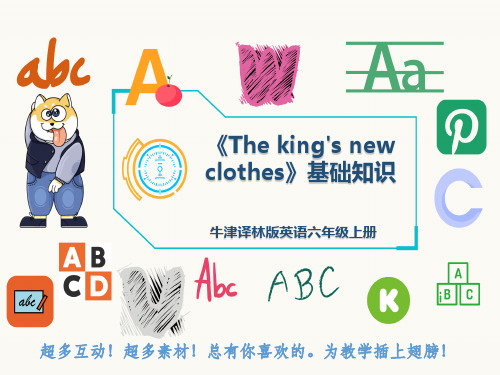
重点语法
be动词在一般过去时中的变化:was/were,其中 Checkout time中的Circle and say对此进行了重点操练.
重点语法
规则动词的一般过去时的五种变化:
( 1 ) 直接+ed; ( 2 ) 以不发音的e结尾,+d; ( 3 ) 辅音+y结尾的,变y为i,+ed; ( 4 ) 末尾是辅音字母加一个元音字母和一个辅音 字母的重读闭音节,应双写末尾的辅音字母,再 +ed. ( 5 ) 不规则过去式形式:如am-was are-were put-put see-saw等。
重点句型
1. Long long ago, there was a king. 很久以前,有一位国王.
2.They looked at the king and shouted. 他们看着国王并且大喊.
重点句型
3.A little boy pointed at the king and laughed. 一个小男孩指着国王并且大笑.
讲,叙述 每个
说 句子
重点单词
10.quick
迅速的,快的
11.next
下一个
12.little
小的,年幼的
重点单词
13.turn 14.think 15.hard
机会 想,思考 努力地,费劲地
重点单词
16.child
孩子
17.magic 有魔力的,神奇的
重点短语
1. the king's new clothes 皇帝的新衣
《The king's new clothes》基础知识
- 1、下载文档前请自行甄别文档内容的完整性,平台不提供额外的编辑、内容补充、找答案等附加服务。
- 2、"仅部分预览"的文档,不可在线预览部分如存在完整性等问题,可反馈申请退款(可完整预览的文档不适用该条件!)。
- 3、如文档侵犯您的权益,请联系客服反馈,我们会尽快为您处理(人工客服工作时间:9:00-18:30)。
卢龙山庄精品托管班6A Unit 1 The king’s new clothes姓名:一,单词/词组1. long long ago 很久以前2. new clothes 新衣服3. make new clothes for you 为你制作新衣服make sth for sb4. show the king his new clothes给皇帝展示新衣服show sb. sth.= show sth. to sb.5. try on 试穿try on the coat=try the coat ontry it/them on6. magic clothes 有魔力的衣服7. walk through步行穿过8. in his new clothes 穿着他的新衣服9. shout at sb. 对某人大叫10. laugh at sb. 对某人大笑11. look at 看….12. point at 指向…13. fit well 非常适合14. an American cowboy 一个美国牛仔15. a Scottish man 一位苏格兰人16. tell a story 讲一个故事17. say a/one sentence 说一句话18. on the mountain 在山上19. the next sentence 下一句话20. live in the house 住在房子里21. tell the boy a story 给这个男孩讲一个故事tell sb. sth.22. it is one’s turn 某人的机会 23. think hard 努力思考24. have to 不得不have to do sth.25. in front of 在….前面(外部)in the front of 在… 前面(内部)26. walk by 路过27. be nice to sb. 对某人好28. look after 照顾29. turn into 变成二,句型1. Long long ago, there was a king. 很久很久以前,有一位国王。
2. The king was happy. 国王很开心。
3. He liked new clothes. 他喜欢新衣服。
4. Two men visited the king. 两个男人拜访了这位国王。
三、练习1.用所给词的适当形式填空。
1.Three days ago,I (bring)a new bike.2.I (live) with my grandparents when I was young.3.The king (not wear) any clothes that day,all the people (point)at him.4.Long long ago, there (be) many old men in the mountain.5.Look,the girl is (wear) a nice dress.2.选择正确答案。
( )1. Long long ago, there a boy called Ma Liang.A. wasB. wereC. isD. are ( )2. I ________ TV a moment ago.A. watchB. watchedC. lookedD. look ( )3. The teacher the blackboard, then we copied the words.A.point atB. pointed atC.is pointing atD. points at ( )4. Do you want ________?A. visit the forestB. visiting the forestC. to visiting the forestD. to visit the forest ( )5. Each student one picture.A. drawB. drawsC. drawingD. to drawing ( )6. She usually _______ new clothes his doll.A. makes…withB. make…forC. makes…forD. make…with ( )7. The lion always walks ______ the forest every day.A. onB. underC. throughD. behind ( )8. Were there ________ people in the street?A. someB. anyC. muchD. a ( )9. What ________ beautiful girl!A. / B an C. a D. the ( )10. The shoes are very cool, but they me.A. are fittingB. fitC. don’t fitD. fittedUnit 2 What a day!姓名:一,单词/词组What a day! 糟糕的一天;忙碌的一天;累人的一天等等(表达的含义很多,根据具体语境来看)这里指“糟糕的一天”1. the 19th of September 在九月十九号2. a sunny/ windy / rainy day 晴朗的/ 刮风/下雨的一天3. a lot of rain 许多雨(不可数)4. a lot of snow 许多雪(不可数)5. see/ watch a parrot show 观看一场鹦鹉表演6. see some interesting parrots看见一些有趣的鹦鹉7. an interesting film 一部精彩的电影8. become windy and cloudy变成大风和阴天(多云)9. fly kites high in the sky风筝放得高10. bring some dumplings带来一些饺子11. bring lunch 带午餐12. some bread and honey 一些面包和蜂蜜13. some drinks 一些饮料14. hungry and thirsty 又饿又渴15. wet clothes 潮湿的衣服16. have/ eat our lunch吃我们的午饭17. black clouds乌云18. meet me/ him/ her/ them/ you 遇见我/他/ 她/ 他们/ 你19. look sad/ happy 看起来很伤心/ 开心20. this morning/ afternoon/ evening 今天早晨/ 下午/ 晚上21. climb up the hill 爬上山22. get up at seven 七点起床23. go to school by bike 骑自行车去上学24. have a picnic野餐25. watch a film看电影26. in the sky在空中27. all day 一整天28. go away 走了29. lose my kite丢了我的风筝30. want to know why想要知道为什么31. what happened出了什么事32. fly too high飞得太高33. find it 找到它34. near the hill 在小山附近35. in your diary 在你的日记里词组(三会)1. hold onto it抓紧它2. fly away飞走了3. find it near the hill在山的附近找到它4. in your diary在你的日记里5. cheer together一起欢呼二、句型:1、今天的天气怎么样?是晴朗的。
A:How’s the weather today? B: It’s sunny. The weather is sunny.2、昨天的天气怎么样?是下雨的。
A; What was the weather like yesterday?B : It was rainy. The weather was rainy.3、我看见一些有趣的鹦鹉。
We saw some interesting parrots.4、我们上周日放风筝了。
We flew kites last Sunday.5、昨天他带来了一些饮料,面包和蜂蜜。
He brought some drinks, bread and honey yesterday.6、两天前她带来了一些水饺。
She brought some dumplings two days ago.7、昨天下雨了。
It rained yesterday.8、Why do you have it?你怎么会拿到它的?三、语法1、过去时态:本课出现的动词不规则变化(同学们要反复朗读)give- gave lose- lost become- became hold- heldcome- came bring- brought buy- brought see- sawwrite- wrote can- could find- found meet- metfly- flew2、rainy - 下雨的(形容词)3、snowy- 下雪的(形容词)rain snow(1)名词:雨(不可数): a lot of rain (1)名词:雪(不可数): a lot of snow (2)动词:下雨(2)动词:下雪例句:a) It rained yesterday. 昨天下雨了。
b) Look! It is raining now! 看!现在正在下雨。
c) It often rains here. 这儿经常下雨。
d) It’s often rainy.经常下雨了。
3. by bike 骑自行车和ride a bike 骑自行车的区别:by bike 属于副词短语,指的是交通方式,比如说别人问,你一般上学用什么交通工具,你回答“I go to school by bike”,而ride a bike 属于动词短语,指的是动作,别人问你说,你在干吗?你说:“I am riding a bike”(正在骑车)而不能说I am by bike,因为by bike 是指交通方式。
四,练习1.找出与所给单词的划线部分读音相同的单词。
dear arm near pear cake bear tape hardhear wearcard name2.根据首字母填空(8分)1.It’s a w day.Let’s fly kites.2.I am thirsty,I need something to d .3.There were many clouds in the sky ,it was c yesterday.Today it is r ,you should take an umbrella.4.My mother t me a story every day when I was a c .st Sunday we f kites in the park.3.填空( )1. like to wear a kilt.A. The ChineseB. The ScottishC. The AmericanD. The English ( )2. Yesterday Nancy was sick, her mother her carefully.A. looked afterB. looked atC. looked forD. looked out( )3. The witch(女巫) the prince the lion.A. turned …onB. talked…with…C. told…toD. turned…into6B Unit 3 Holiday fun 姓名:一,单词、词组1. come back to school 返校2. the National Day holiday 国庆节假期3. call you 打电话给你4. visit my aunt拜访我的婶婶5. Shanghai Museum上海博物馆6. see many interesting things看见很多有趣的东西7. go to a farm 去农场8. near Star Lake 在星湖附近9. pick some oranges摘一些橙子10. go fishing去钓鱼11. catch a big fish抓到一条大鱼12. Tian’anmen Square天安门广场13. Palace Museum故宫博物院14. Summer Palace 颐和园15. the Great Wall长城16. pick an orange for me为我摘一个橙子17. main school holidays学校主要的假期18. the Easter holiday复活节假期19. the summer holiday暑假20. the Christmas holiday圣诞节假期21. come home late晚回家22. have a fashion show有一场时装秀23. love beautiful clothes爱漂亮的衣服24. be excited about the show 对秀感到激动25 wear paper clothes 穿纸衣服26. wear a lot of bottles穿很多瓶子27. ask about the show询问关于秀的事28. go well进展顺利29. at first在开始的时候30. heavy rain大雨31. the Car Museum轿车博物馆32. visit his cousin拜访他的表兄33. have a birthday party举行一个生日聚会34. catch a fish for me为我抓一条鱼二,动词过去式catch---caught eat---ate get---got meet---met lose---losthold---held find---found三.重点句型:1. What did you do for the holiday?2. How was your holiday? It was great fun.3. Why did you call me?Because I wanted to give the fish to you.4. What great fun!5. It is time for dinner.拓展:1. excited / exciting I’m excited at the exciting running race.专项训练四,练习一、单项选择( ) 1. What did you do _______ your holiday?A. toB. withC. for( )2. He _______to the cinema every Sunday morning.A. goB. goesC. going( )3. We _______ in the cinema yesterday.A. wasn’tB. didn’tC. weren’t( )4. I called you ________ I wanted to give you the fish.A. aboutB. ofC. because( )5. ______ there ________ fruit trees on the farm?A. Were, anyB. Are, anyC. Are, some( ) 6. Look! He ‘s____________ about the show.A. excitedB. excitingC. excite( ) 7. Jack came ________ home at five this afternoon.A. back toB. backC. to( ) 8. - The parrot can speak to me on the show.-_____________A. Thank you very much.B. That’s a good idea.C. What great fun. ( )9. Did Sam ______ paper clothes yesterday afternoon?A. woreB. wearC. wearing( ) 10. The show went _______________.A. goodB. niceC. well二、完成句子。
